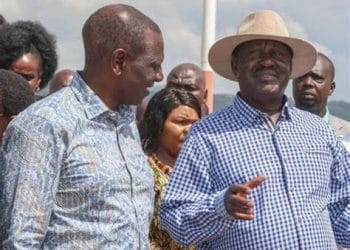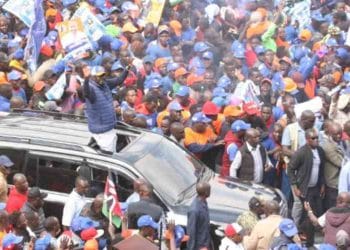Raila Amolo Odinga, Kenya’s long-serving opposition leader and former Prime Minister, has died at the age of 80 while undergoing treatment in India. His death, confirmed on 15 October 2025, marks the end of a political era that spanned more than four decades and defined much of Kenya’s democratic journey.
Raila collapsed during a morning walk at the Sreedhareeyam Ayurvedic Eye Hospital and Research Centre in Kerala, where he had been receiving alternative therapy for age-related ailments. Medical personnel rushed him to Devamatha Hospital in Ernakulam, where doctors pronounced him dead shortly after 9:52 a.m. local time. Hospital officials reported that efforts to resuscitate him failed. The news was conveyed to Kenyan diplomats in New Delhi, who coordinated with Indian authorities for immediate repatriation.
The Kenyan High Commission in India confirmed that all formalities were completed swiftly, with the Indian Ministry of External Affairs extending logistical and consular support. Mr Odinga had arrived in India on 10 October, accompanied by his wife, Ida Odinga, and a small delegation, and had been scheduled to return home later in the week.
Within hours of the confirmation, President William Ruto addressed the nation from State House Nairobi. His televised statement, sombre and deliberate, described Raila Odinga as “a giant of democracy, a fierce freedom fighter, and a tireless warrior of good governance.” The President declared seven days of national mourning, ordered flags to fly at half-mast across all public buildings, and announced that Mr Odinga would be accorded a full state funeral.
“Raila dedicated his life to the cause of Kenya’s democracy. His voice, his resilience, and his courage changed our nation forever,” the President said, calling for unity and dignity during the mourning period. He also announced the establishment of a National Funeral Steering Committee, chaired by Deputy President Kithure Kindiki and Siaya Senator Oburu Odinga, to oversee the state funeral arrangements in consultation with the family.
The Odinga family released a statement expressing deep sorrow and gratitude for the outpouring of sympathy. Senator Oburu Odinga said, “Our brother, father, husband, and comrade has rested. We thank Kenyans and friends from across the world for standing with us. We ask for patience as we finalise arrangements in line with his wishes.”
Family sources confirmed that Mr Odinga’s will includes an explicit instruction that he be buried within seventy-two hours of his death. “He was clear that his resting place should be his ancestral home at Opoda Farm in Kango Ka Jaramogi, Bondo,” said a family member familiar with the arrangements. That request has placed the government and the funeral committee under pressure to expedite repatriation and ceremonial preparations.
According to the official funeral plan, Raila’s body will arrive in Nairobi aboard a Kenya Airways flight early on Thursday, 17 October. The plane will be received at Jomo Kenyatta International Airport by President Ruto, senior government officials, ODM party leaders, and members of the Odinga family. The Kenya Defence Forces will mount a ceremonial guard of honour before the casket is moved to Lee Funeral Home for preservation.
On Friday morning, the body will lie in state at Parliament Buildings, where Kenyans will have an opportunity to file past and pay their respects. A national memorial service will take place at Nyayo National Stadium on Saturday, expected to draw thousands of mourners, diplomats, and dignitaries.
The burial ceremony will be held on Sunday, 19 October, at Opoda Farm in Bondo. The event will combine state military honours with traditional Luo rites. Construction work, crowd management, and security coordination are already underway in the rural compound, which is expected to host tens of thousands of mourners.
Indian Prime Minister Narendra Modi extended his condolences, describing Mr Odinga as “a cherished friend of India and a visionary African statesman.” He noted their past engagements, including Mr Odinga’s visits to Gujarat during Mr Modi’s tenure as Chief Minister. “India and Kenya have lost a bridge-builder whose belief in people-to-people connection was profound,” he said.
From Addis Ababa, the African Union Commission chairperson mourned the former Prime Minister as “a steadfast champion of democracy, peace, and development,” citing his tenure as the AU High Representative for Infrastructure Development in Africa. South African President Cyril Ramaphosa, Ugandan President Yoweri Museveni, Tanzania’s President Samia Suluhu Hassan, and Nigerian President Bola Tinubu all issued condolence messages praising Odinga’s contribution to Pan-Africanism and democratic reform.
In Washington, the U.S. Secretary of State said, “Raila Odinga’s life embodied the struggle for liberty and fairness. His pursuit of dialogue over violence was a model for Africa and the world.” British Prime Minister Keir Starmer called him “a statesman of integrity whose influence extended well beyond his borders.”
Back in Kenya, leaders across the political divide temporarily suspended partisan hostilities to mourn him. Former President Uhuru Kenyatta described him as “the conscience of the Republic,” while Deputy President Kindiki said, “Kenya’s politics will not be the same again. We are poorer today.”
At Kondele in Kisumu, thousands poured into the streets waving orange flags, singing liberation songs, and holding candles. In Nairobi, long queues formed outside Orange House, the ODM headquarters, where supporters signed condolence books. Across markets, churches, and universities, people spoke of him as “Baba” — a father figure, a symbol of courage, and a relentless campaigner for social justice.
Raila Odinga’s political journey began in the turbulence of post-independence Kenya. Detained without trial for nearly a decade after the 1982 coup attempt, he emerged as one of the foremost architects of the multiparty democracy movement that ended the one-party state in the 1990s. His political campaigns were fierce, his rhetoric often soaring, his influence unmatched. He served as Prime Minister from 2008 to 2013 under a power-sharing deal that helped steer Kenya out of post-election violence and laid the foundation for the 2010 Constitution.
Even in defeat, his impact never diminished. His rallies drew multitudes. His words shaped policy debates. His handshake with President Uhuru Kenyatta in 2018 was both a political truce and a moment of national healing. Though he never captured the presidency, his imprint on Kenya’s political consciousness is indelible.
For his supporters, Raila’s death is not merely the loss of a leader, but the passing of an idea — that democracy is a struggle, and that justice is always worth pursuing.
As preparations for his state funeral continue, the nation remains in collective reflection. Government agencies have mobilised resources, with roads, stadiums, and airspace expected to be tightly controlled for the memorial days. The Ministry of Interior has cautioned the public against unauthorised processions, while urging Kenyans to honour him peacefully.
The government has published a timeline of official events:
• Thursday, 17 October: Arrival of the body at Jomo Kenyatta International Airport and transfer to Lee Funeral Home.
• Friday, 18 October: Lying in state at Parliament Buildings for public viewing.
• Saturday, 19 October: National Memorial Service at Nyayo National Stadium, Nairobi.
• Sunday, 20 October: State funeral and burial at Opoda Farm, Bondo.
Expected dignitaries include President William Ruto, former President Uhuru Kenyatta, regional heads of state, AU officials, Commonwealth representatives, and members of the diplomatic corps.
In his rural home, locals have erected tents along the route from Bondo town to Opoda Farm. Security services have been deployed to manage traffic and maintain order. Religious leaders are preparing for ecumenical prayers, while Luo elders plan traditional rites.
As night fell on Nairobi on the day of his death, crowds lit candles outside Parliament, singing “Baba while you were away.” On social media, tributes flooded in, from global figures to ordinary citizens who had queued in the rain to vote for him.
Raila Odinga’s journey from political prisoner to prime minister, from opposition firebrand to elder statesman, mirrors Kenya’s own story — a nation tested by divisions yet anchored by resilience. His death leaves a void that will be felt across generations, and in the words of a mourner outside Orange House, “He did not just fight for power, he fought for us.”
As the final preparations unfold, Kenya stands united in grief, reflecting on a man whose political battles, personal sacrifices, and enduring defiance helped define its modern identity. His burial at Opoda Farm will close a monumental chapter in the country’s history, one that will continue to shape its politics, its memory, and its conscience for years to come.



















